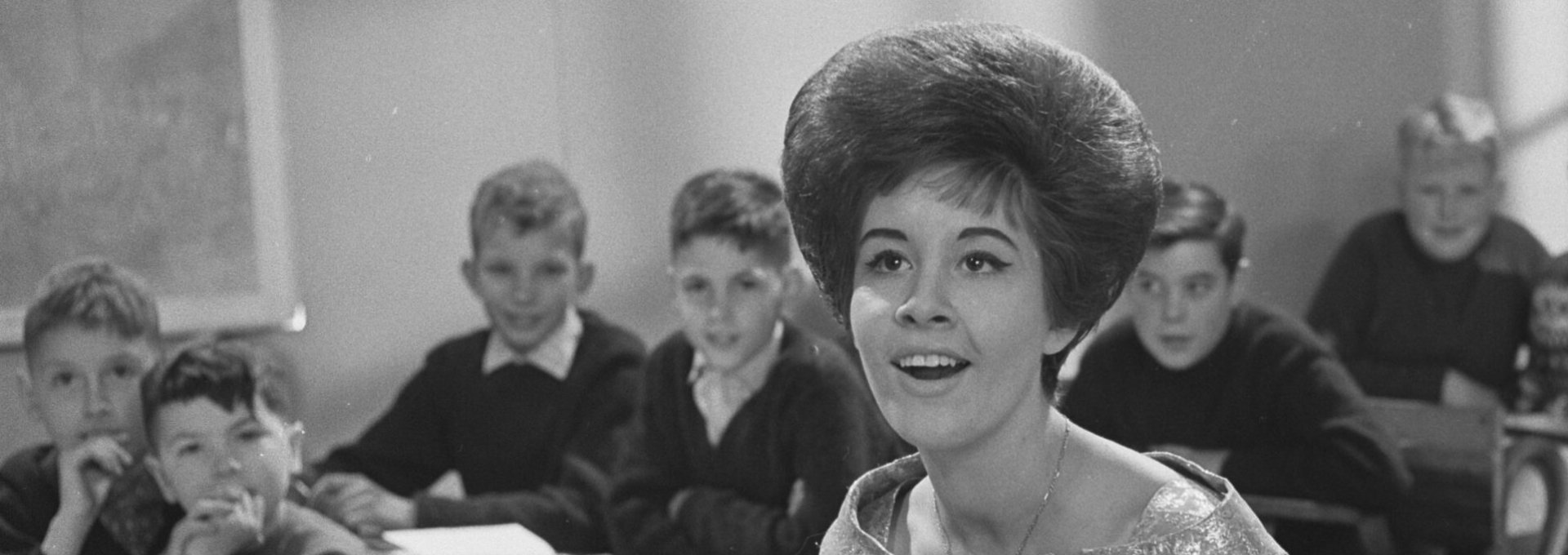Since the Beatles broke up over 50 years ago and left a legacy that reshaped music forever, the subject of their influences has been endlessly discussed. What artists did these four lads from Liverpool listen to and take inspiration from? What music inspired their own unique style that propelled them to global fame? Often, we hear the names of rock ‘n’ rollers such as Elvis Presley, Chuck Berry, Little Richard, Bully Holly and Carl Perkins brought up – and rightfully so. But too often, the names of iconic female artists are omitted from discussion. In their early years, The Beatles mined the catalogues of female singers and girl groups, and their songs were repeatedly used in their live gigs and on albums. Even by 1965 when The Beatles generally stopped performing covers, the ‘girl group’ sound can be heard in their own songs, particularly in their harmonies and background vocals. In an industry where women were underrepresented and overshadowed, we owe a huge debt to iconic women who filled the charts before the Fab Four.
The Shirelles
Formed in 1957, the Shirelles were one of the first major female vocal groups of the rock era and are often credited with launching the girl group genre. In January 1961, before the Beatles had even made their debut at the Cavern Club, the Shirelles achieved their first Billboard number 1 with ‘Will You Still Love Me Tomorrow’. But it was what was on the B-side of that single that The Beatles caught hold of – a lesser-known song called ‘Boys’. This, along with another Shirelles smash hit ‘Baby It’s You’ became a staple part of The Beatles’ stage act from 1961 to 1963 and both songs were included on their debut album Please Please Me, making them the only artist to be honoured twice on the album. In a 1980 interview for Playboy, John Lennon said he considered ‘PS I Love You’ to be Paul’s crack at ‘Soldier Boy’ – a Shirelles number 1 from early 1962.
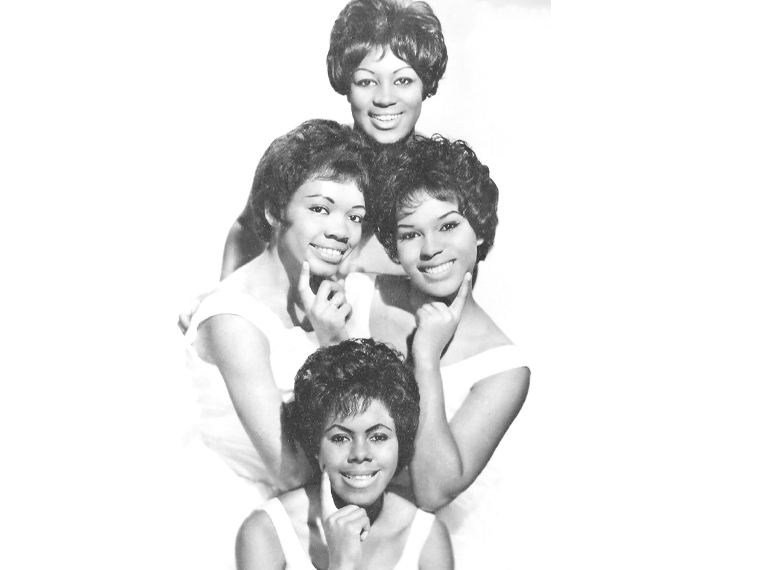
The influence and impact of The Shirelles was massive – not only did they lay the blueprint for future female stars to follow, but their crossing of racial demographics in both the US and UK, before that of other Motown acts, has been noted as reflecting the early success of the Civil Rights Movement. They have since been awarded multiple honours for their contributions to music, inducted into the Rock and Roll Hall of Fame in 1996 and named one of the 100 Greatest Artists of All Time by Rolling Stone in 2004.
The Ronettes
Despite forming six years earlier, the Ronettes first achieved major success in 1963 after the release of their smash hit ‘Be My Baby’. When they first toured the UK in 1964 with the Rolling Stones as their support act, The Beatles met the group after seeing them perform at the London Palladium and both groups became good friends. The Beatles later asked the Ronettes to open for them on their 1966 world tour, making them the only girl group to ever do so, before splitting up in 1967.
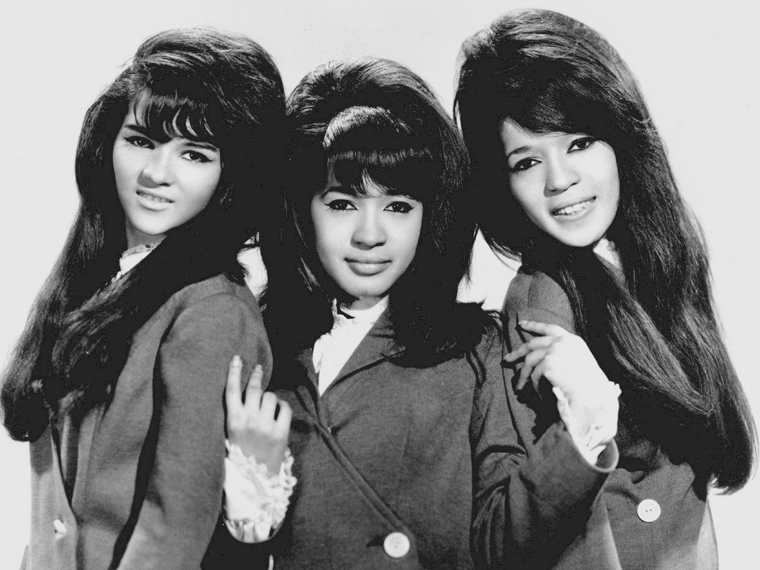
I remember them coming to New York the first time, and John Lennon called me saying, ‘Ronnie, we don’t know what to do. We’re prisoners here. You gotta come up and get us out of here.’ They didn’t know anybody in America.
– Ronnie Spector
The Ronettes placed nine songs on the Billboard Hot 100, five of which became Top 40 hits. As well as being nominated for a Grammy Award in 1965, they were later inducted into the Grammy Hall of Fame in 1999 for ‘Be My Baby’ and the Rock and Roll Hall of Fame in 2007. In addition to The Beatles, the group inspired a fan base which included that of other successful artists, such as Brian Wilson of the Beach Boys, Billy Joel and Bruce Springsteen who have all cited Ronnie Spector as having an influence on their own music. Sadly, Ronnie passed away in January 2022.
The Marvelettes
Co-written by original lead singer Georgia Dobbins, ‘Please Mr. Postman’ was the debut single for American girl group the Marvelettes and became the first Motown song the reach number one on the Billboard Hot 100 pop singles chart, before the group had even graduated high school. Along with several other girl groups, the Marvelettes were yet another who’s music caught the attention of The Beatles. ‘Please Mr. Postman’ became a staple part of their live repertoire in the early 1960s and was included on their second studio album With The Beatles in 1963. Although a big hit in the US, the track did not make it into the British top fifty; this meant few in the UK knew the song and allowed The Beatles to make it their own amongst the Liverpool music scene.
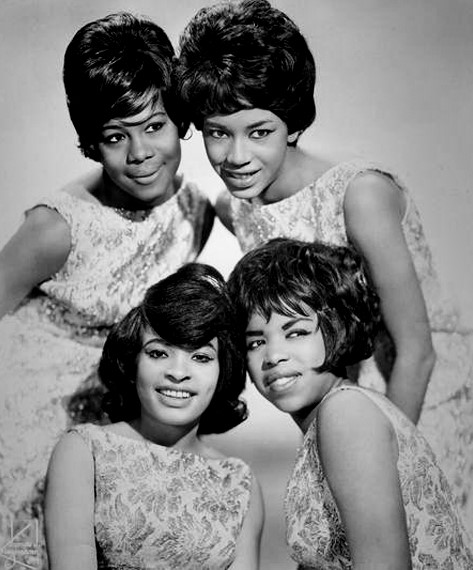
Despite ill health reducing the group’s numbers and altering their line up over the years, The Marvelettes released several hits throughout the 1960s. In 2017, Billboard ranked ‘Please Mr. Postman’ number 22 on its list of 100 Greatest Girl Group Songs of All Time.
Rosie Hamlin
The frontwoman of Rosie and The Originals, Rosie Hamlin is best known for her 1960 single ‘Angel Baby’. The song debuted on the Billboard Hot 100 in December that year when she was just 15 years old and remained in the charts for 13 weeks. Despite not having another Top 40 hit, Rosie Hamlin made a lasting impression on John Lennon. In a 1969 interview for Life Magazine, he cited Rosie as being one of his favourite singers and went on to record his own version of ‘Angel Baby’ in 1973 for his Rock ‘n’ Roll album, although it was not released until 1986, after his death. In the intro of a remixed version of the track released in 2004, Lennon calls the original ‘one of his favourite songs’ and says: “send my love to Rosie, wherever she may be”. Rosie Hamlin was the first Latina to be honoured by the Rock and Roll Hall of Fame and the first Latina to appear on Dick Clark’s American Bandstand in 1961.
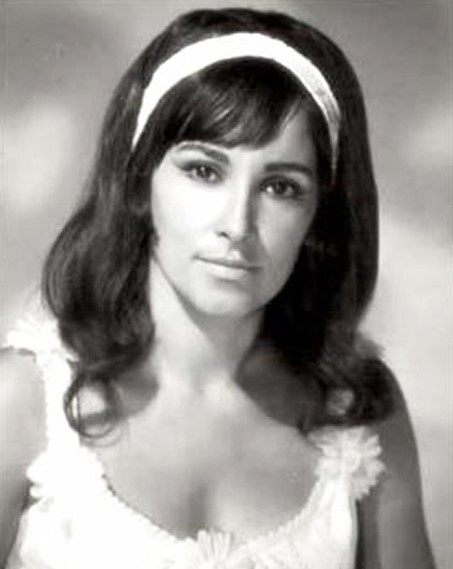
Helen Shapiro
During the 1960s, Helen Shapiro was one of Britain’s most successful female artists. In 1961, when she was just 14 years old, Shapiro recorded two UK chart toppers – ‘You Don’t Know’ and ‘Walkin’ Back to Happiness’. The Beatles joined Shapiro on her 1963 English tour where they were fourth on an eleven-act bill headlined by a then 16-year-old Helen Shapiro. It was their first ever tour booking. After being approached by her producer with the idea, The Beatles wrote the song ‘Misery’ especially for Shapiro’s jazzy vocals, but later recorded it themselves for their Please Please Me album when her team decided not to use the song. Following the success of her pop music career in the 1960s, Shapiro went on to achieve further success as a film actor, musical theatre performer and jazz singer before retiring in 2002.
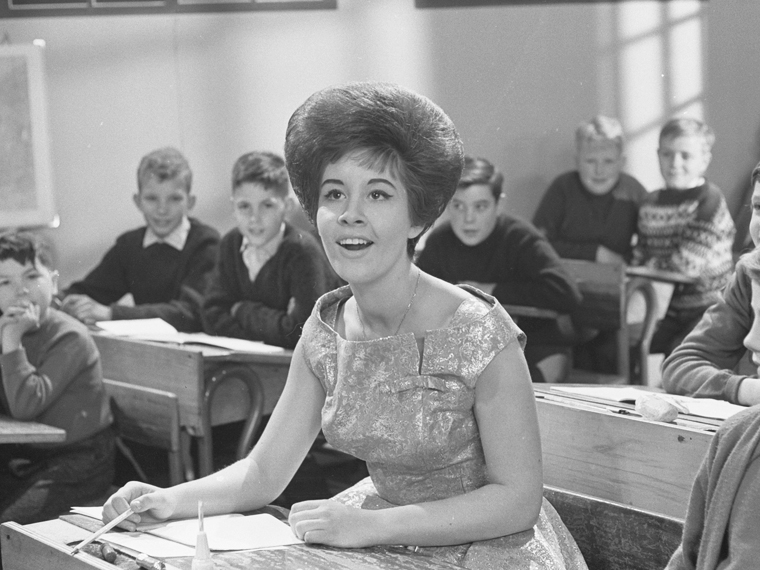
Although there are many more amazing women who impacted The Beatles and their music over time, these five artists are just some of the most notable from their formative years. Please Please Me alone would not exist as it is without women in music. In addition to ‘Baby It’s You’, ‘Boys’ and ‘Misery’, two other legendary tracks recorded for the debut album were popularised by women – ‘Devil In Her/His Heart’ by the Donays and ‘Chains’ written by the legendary Carole King and recorded by the Cookies. The album went on to hit number 1 on the UK album chart and remained there for 30 weeks, launching The Beatles to global fame.
Even though the 1960s saw a new generation on female singers, songwriters and musicians, the industry remained a heavily male dominated field and still is today with women accounting for just 22% of artists, 12% of songwriters and 2% of producers. So, to the women who crossed over the industry barriers 70 years ago and helped shaped the iconic sound of rock ‘n’ roll – ‘Thank You Girl’.
